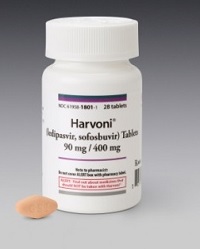 Gilead Sciences ($GILD) picked up a much-anticipated FDA approval for Harvoni, a combination therapy for hepatitis C that promises to cure the majority of patients without the need for painful injections that have plagued patients for years.
Gilead Sciences ($GILD) picked up a much-anticipated FDA approval for Harvoni, a combination therapy for hepatitis C that promises to cure the majority of patients without the need for painful injections that have plagued patients for years.
The drug combines NS5B-blocking sofosbuvir, already a blockbuster as Sovaldi, with ledipasvir, an NS5A inhibitor. In three Phase III studies on patients with the tough-to-treat genotype 1 variant of the virus, Gilead's combo notched cure rates as high as 99.1%, all without the use of interferon or ribavirin.
Harvoni is expected to peak at more than $10 billion a year, outstripping Sovaldi, the fastest-growing drug of all time. And that estimate may well be conservative, as analysts expect a huge uptick in prescriptions from doctors who have been effectively warehousing hep C patients until an injection-free treatment won approval. Prime Therapeutics, an insurer-owned pharmacy benefit manager, expects the resulting surge to increase the hep C cost burden on health plans by as much as 40% over 2014, which was already a record year.
That's because curing the virus isn't cheap. As TheStreet's Adam Feuerstein reported, Gilead plans to sell its new combo pill at $94,500 for a 12-week regimen-roughly $10,000 more than the Sovaldi price that nearly set off a payer revolt--and $63,000 for 8 weeks of therapy, a shorter dosage approved for certain treatment-naive patients.
"Gilead is proud to have played a role in developing a once-daily therapy that is safe, simple and well-tolerated," CEO John Martin said in a statement. "We are now working to ensure rapid and broad access to Harvoni."
But Harvoni won't be the only all-oral hep C treatment on the market for long. AbbVie ($ABBV), developing a three-drug cocktail with similar efficacy, is just a few months behind, filing with the FDA in April and expecting to commercialize its combo by year's end. Meanwhile, Merck's ($MRK) mix of MK-5172 and MK-8742 has charted impressive results in Phase II, leading analysts to pencil the company in for a second-place finish behind Gilead once it makes its way to market.
That said, Gilead will have a bit more elbow room in hep C with the surprise exit by Bristol-Myers Squibb ($BMY), which announced this week that it would abandon an effort to win FDA approval for a two-drug combo of its own, focusing instead on a long-term effort to develop shorter treatment options for the virus.
And Gilead's other rivals are thinking the same way, pursuing programs that could cure hep C in as few as four weeks. Merck splurged $3.9 billion on Idenix Pharmaceuticals in June to get its hands on some assets that, combined with its in-house treatments, could lead to speedy cures. And Johnson & Johnson ($JNJ), owner of the FDA-approved NS3/4A protease inhibitor Olysio, paid $1.75 billion for private biotech Alios BioPharma last month with a similar goal.
Harvoni picked up an endorsement from the European Medicines Agency last month, clearing the way for a likely continental approval near the end of the year.
- read the FDA's statement
- here's Gilead's announcement